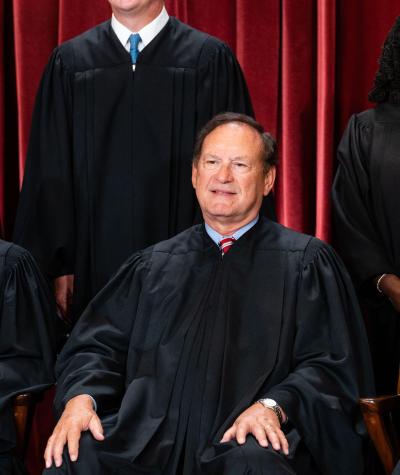Last fall, while adopting a new “code of conduct,” the U.S. Supreme Court stated that there was a “misunderstanding that the Justices of this Court, unlike all other jurists in this country, regard themselves as unrestricted by any ethics rules."
The adoption of these new ethics rules had come on the heels of a string of questionable ethical conduct by numerous justices.
Despite this recent move intended to fix the Court's public perception of corruption — which itself was widely seen by experts as inefficient — news that Justice Alito’s home prominently displayed an American flag in a way that seemed to express support for a presidential candidate only seems to prove that the widespread notion that the Court has low ethical standards is far from a misunderstanding.
Most importantly, Justice Alito’s excuse for the partisan activity demonstrates that the Court’s begrudgingly adopted code of conduct will never alone build public trust in the institution because there is no enforcement mechanism.
On May 16, the New York Times reported that an American flag was flown upside down outside Justice Alito’s home just a few days after the January 6 attack on our country.
At that time, flying the flag upside down was a sign of support for overturning the 2020 election results in favor of then-President Donald Trump. Justice Alito’s explanation was that his wife was responsible for the flag’s placement.
The ethics rule that applied then as well as now to Justice Alito, according to Chief Justice Roberts’ 2011 report on ethics, is that a justice “should refrain from political activity” and should not “publicly endorse or oppose a candidate for public office.” But ethics rules such as this one, which are not accompanied by meaningful enforcement, equal excuses without accountability.
Now that Justice Alito has essentially created a “rogue spouse” exception to the ethics rules, the other justices have an unclear standard. Can justices now display campaign yard signs and bumper stickers if done by their spouse?
If the Court’s ethics code included an internal ethics office responsible for investigating these violations, it could publicly state the ethics standard that applies in these situations to provide transparency, build confidence in the Court, and give the justices guidance for their behavior.
Without enforcement of the code, the controversy surrounding Justice Alito’s alleged political support of overturing the 2020 election results will influence whether the public respects the legitimacy of the Court’s pending decision related to former President Trump.
These political ethics issues are not new for the Court, but they have become much worse.
Twenty years ago, the ethics controversy facing the Court involved Justice Scalia refusing to recuse from a case related to the vice president after the justice traveled on a hunting trip with him. In 2016, it was Justice Ruth Bader Ginsburg making remarks opposing then-presidential candidate Trump.
More recently, Justice Clarence Thomas has ignored calls to recuse himself from matters concerning January 6 despite his spouse’s connection to the event and involvement with the congressional investigation on the matter.
In each case, the Court did not release any ethics guidance, and these issues contributed to an ethics culture of unreported gifts, suspicious real estate transactions, misuses of official resources, and leaks of Court decisions.
Justice Alito has planted a flag at the top of the pile of ethics controversies covering the Supreme Court. The Court can no longer pretend that an unenforceable code of conduct will resolve the public’s concern with their ethics. It must stop window dressing and adopt an enforceable ethics code.

